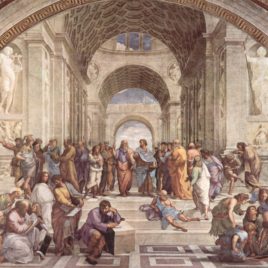
Frequently on our journeys, we’re exposed to the richness and power of myth all over the world. From the Andes of Peru and jungles of Mexico to the rivers and stupas of India and Nepal—myth runs deep through the blood of most of our journey destinations. Many of our pilgrims wish to continue to learn more about these rich traditions independently.
The power of myth lies in its ability to reveal higher truths through what we often declare as false and fiction. The Power of Myth is actually the title of a Joseph Campbell Book named after the 1988 PBS documentary titled Joseph Campbell and the Power of Myth.
Campbell was subject to other documentaries as well, including The Hero’s Journey (co-screen written by our very own journey leader, Phil Cousineau).
Anyway, here’s a Joseph Campbell quote from the book that further declares the power of myth:
“Mythology is not a lie, mythology is poetry, it is metaphorical. It has been well said that mythology is the penultimate truth—penultimate because the ultimate cannot be put into words. It is beyond words. Beyond images, beyond that bounding rim of the Buddhist Wheel of Becoming. Mythology pitches the mind beyond that rim, to what can be known but not told.”
This piece will lay out how to go about becoming a scholar of mythology if you so choose. To be successful on this path, you’ll need to get to know persistence, resilience, and balance very well. Although Campbell undertook years of intense study during the Great Depression, there’s definitely a balanced, integrative way to go about this.
Here’s how.
Find the Power of Myth in Books
Right. This one is obvious. But it’s really important.
Books are an invaluable way to study mythological traditions. Here’s another Joseph Campbell quote revealing the effects of a consistent reading habit on the mind:
“Sit in a room and read–and read and read. And read the right books by the right people. Your mind is brought onto that level, and you have a nice, mild, slow-burning rapture all the time.”
Read the right books by the right people. That’s stellar advice. Reading what no one else is reading will bring your mind to a level that many minds simply aren’t reaching.
Now, in terms of tapping into the richness of mythological traditions, we suggest beginning with Campbell’s books. Read The Hero With a Thousand Faces, and yes, The Power of Myth. Campbell’s work provides a vast brushstroke of what myth is all about while also offering a taste-tester of many traditions and stories.
From there, you’ll feel more confident diving into the ancient texts themselves. Read the Bhagavad Gita and the essential Maya sacred texts: Popol Vuh, Chilam Balam, Maya Codices. Read Homer, Virgil, and Dante. Read Gilgamesh. Read from the various native traditions of the New World, such as the Story of Skywoman.
Read widely. Keep the rapture burning. Keep a journal. You’ll begin to make intriguing connections. The monomythic nature of myth will reveal itself. You’ll begin to connect the journey of the many mythological heroes to your own. More on that later.
Experience Mythological Sites Around the World
Taking journeys to experience rich mythological traditions first-hand is extremely powerful. Information will stick like no other and seemingly endless inspiration will flow in the process.
To let you taste the possibilities, read about our epic pilgrimage through Nepal and India, Finding Buddha with Dr. Miles Neale and Special Guest Geshe Tenzin Zopa. This is a sacred pilgrimage through Nepal and India to discover the milestones of Buddha’s epic biography. On this journey of inner and outer discovery, you will visit the four holy sites of Lumbini, Kushinagar, Sarnath, and Bodhgaya to connect with the historical Buddha.
Of course, the historical Buddha is real, yet via this journey, you’ll discover stories and teachings that, according to Campbell, reveals the “penultimate truth” that’s “beyond images, beyond that bounding rim of the Buddhist Wheel of Becoming.”
Sure, you can grab a couple of books about the story of the Buddha and the richness of Buddhist tradition. Maybe you’ll grab Herman Hesse’s novel Siddhartha or some amazing dharma literature by Thich Nhat Hanh.
But what will help you most on your journey, studying and reading, or walking the walk yourself? The answer is both.
Walk Your Own Hero’s Journey
When studying myth, there’s so much to engage with. The stories, the teachings, the cultures, the literature, the history… It all floods the consciousness and even begins to appear in the scholar’s dreams.
I think after some time of studying and experiencing mythology, after repeated exposure to the hero’s journey, an integration period begins. A period begins where we realize that mythology isn’t only about knowing, but about living.
One last Joseph Campbell quote to pinpoint the importance of a personal hero’s journey:
“Society has provided [children] no rituals by which they become members of the tribe, of the community. All children need to be twice-born, to learn to function rationally in the present world, leaving childhood behind.”
This idea of initiation and rebirth brings to mind the work of another important mythologist of our time: Michael Meade. He founded the Mosaic Cultural Foundation to bring the power of myth to re-initiate at-risk youth, combat veterans, and refugees back into the creative power of their own lives.
Meade has an impressive body of literature that aims to inspire the importance of rebirth through mythological and anecdotal storytelling. His work has undoubtedly helped many walk their personal hero’s journeys.
Final Thoughts on the Power of Myth
How are you feeling now? More confident to study mythology?
After this read hopefully the importance, and yes, the power of myth, is more obvious. To the untrained mind, “myth” comes off as “unreal” or even “fake.” But to the scholar, myth is the foundation by which a culture rests. It is what makes tradition last and personal growth through spirituality and ancient teachings accessible in even the modern-day.
Remember:
“Myths are intended to break the spell of time and release us from the immediate pressures and limitations of daily life.” — Michael Meade
~Jacob Lopez, staff writer

